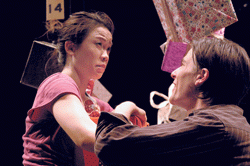The Playwrights' Place
For young playwrights, opportunities to hear their words on stage are rare. Staged readings, in which the actors may have scarcely skimmed the script, can be a total letdown. So for Alice Tuan ’97 MFA, Paul Grellong ’01, and Stephen Karam ’02, the chance to spend July developing their works-in-progress with professional actors and directors was “a dream situation,” as Karam put it.
The three were invited to participate in the Brown/Trinity Playwrights Repertory Theatre, a two-year-old collaboration between the Department of Theatre, Speech, and Dance, the Office of Summer Studies, and the Brown/Trinity Consortium. The program culminated in a late-July Festival Week, when all three plays made their stage debuts alongside student work.
The real drama, however, took place earlier. During the first rehearsal of Speech and Debate, Karam’s black comedy about a high school sex scandal in small-town Oregon, the playwright looked up from a blue binder in his lap and beamed. “I can feel the scene now,” he said. “ I just need to cut a page.”
Playwrights Rep was designed to give promising writers a place to hone their scripts in conjunction with professional actors and directors, mostly Brown/Trinity graduate students and alumni. “There’s a certain amount of work that you can’t accomplish alone, that you can only accomplish around the table with collaborators,” says Grellong, whose play Manuscript ran off-Broadway in summer 2005 and who has also written for Law and Order: Special Victims Unit.
Grellong used his time this summer to develop Power of Sail, set in the cutthroat world of academia, in which a lie told by one professor ends up destroying several careers. The deception centers around a Holocaust denier who runs an advertisement in the college newspaper and is ultimately invited to speak on campus.
Alice Tuan, who’s been widely produced on the West Coast, worked on Iggy Woo, which is about two people who work in a mall and fall in love. They’re both trying to quit smoking and their nicotine fits provide ongoing comedy, while the universality of addiction, says Tuan, helps to de-exoticize her Asian characters and “complicate the fabric” of stereotypes.
Playwrights Rep also hosted for-credit programs for college and high school students, who took classes and workshops; helped with lighting, props, and other technical work on the main plays; and developed and staged their own new play. In an artistic trickle-down, Playwrights Rep members mentored the college students, who, in turn, mentored the high school kids. “You never learn anything as well as you learn it when you teach it,” says artistic director Lowry Marshall, who teaches theater at Brown and founded the new program.
Playwrights Rep replaces the Brown Summer Theatre, which for more than twenty-five years produced revivals, murder-mysteries, and other “light summer fare,” says Pamela Pion, the theater department’s office manager. “We were looking for a new way of doing theater in the summertime,” says Marshall, “which is more in keeping with Brown’s dedication to the creation of new work.”
Karam, for one, thinks it’s working. He says what he submitted last winter was not even a play, but an idea and a draft of some scenes. It was not until he got the green light from Marshall that he was able to buckle down and write. He says, “This play literally would not exist without this opportunity.”






